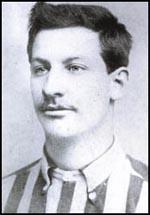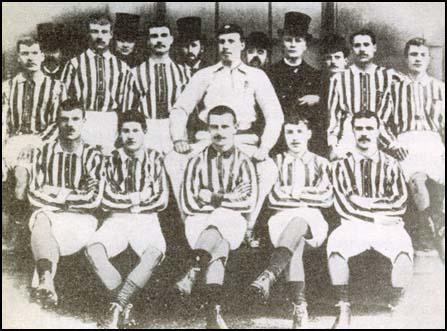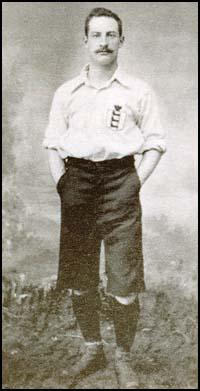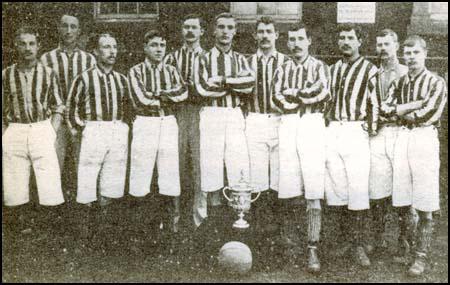Billy Bassett

William Bassett was born in West Bromwich on 27th January, 1869. Educated at Christ Church School he played football for West Bromwich Strollers and Old Church. He was only 5 ft. 5 in. tall and at first he was considered to be too small to be an effective professional footballer. However, in 1886 he was signed by West Bromwich Albion.
Bassett had a great first season with the club. WBA scored 195 goals in 58 first-team matches. The club also enjoyed a good run in the FA Cup beating Stoke City (4-1), Old Carthusians (4-2) and Derby Junction (3-0) to reach the final against Preston North End.
A crowd of nearly 20,000 watched the final at the Kennington Oval on 24th March, 1888. The 19-year-old Bassett was the star of the game and after one long dribble he passed to Jem Bayliss who scored the opening goal. Fred Dewhurst scored an equalizer early in the second-half but WBA gradually got the upper-hand. According to Philip Gibbons in Association Football in Victorian England: "Bassett tormented their defence". He eventually provided the cross for George Woodhall to score the winning-goal ten minutes from time.
Bassett's performance was so good that he was selected to play for England against Ireland on the following Saturday. England won 5-1.
In his book, The Essential History of West Bromwich Albion, Gavin McOwan argues: "He (Bassett) would bewilder defenders by suddenly stopping the ball dead in the middle of a sprint, leaving his marker to carry on running while he had already changed tack or delivered his cross." Ernest Needham, the English international, described Bassett as "without doubt, the best outside right in the British Isles".

Albert Aldridge, Charlie Perry, Ezra Horton, Bob Roberts, George Timmins, Harry Green;
front row, George Woodhall, Billy Bassett, Jem Bayliss, Tom Pearson, Joe Wilson.
On 2nd March, 1888, William McGregorcirculated a letter to Aston Villa, Blackburn Rovers, Bolton Wanderers, Preston North End, and West Bromwich Albion suggesting that "ten or twelve of the most prominent clubs in England combine to arrange home and away fixtures each season." John J. Bentley of Bolton Wanderers and Tom Mitchell of Blackburn Rovers responded very positively to the suggestion. They suggested that other clubs should be invited to the meeting being held on 23rd March, 1888.
The following month the Football League was formed. It consisted of six clubs from Lancashire (Preston North End, Accrington, Blackburn Rovers, Burnley, Bolton Wanderers and Everton) and six from the Midlands (Aston Villa, Derby County, Notts County, Stoke, West Bromwich Albion and Wolverhampton Wanderers).
The first season of the Football League began in September, 1888. Bassett and WBA's other professional players received 10 shillings a week, with no bonuses or expenses. Preston North End won the first championship without losing a single match and acquired the name the "invincibles". West Bromwich Albion finished in 6th place with Bassett ending up as the club's top scorer with 14 goals in 25 games.

Bassett won his second international cap against Wales on 23rd February, 1889. Bassett scored his first goal for his country in the 4-1 victory. Bassett was retained for the important game against Scotland at the Kennington Oval. This time he scored two goals in England's 3-2 win. The England team at this time included players such as Jack Southworth, James Forrest, Bob Roberts, Billy Townley, Charlie Perry, Bob Holmes, Bob Roberts, Charlie Athersmith, Harry Wood, Edgar Chadwick, Jack Southworth, Johnny Holt, John Goodall, George Woodhall and Fred Spiksley.
Preston North End also won the First Division title in the 1889-90 season. West Bromwich Albion finished in 5th place and Bassett only managed to score three goals in 21 games. However, he retained his place in the England team and took part in the games against Wales (3-1) and Scotland (1-1).

Mark Nicholson, Jack Reynolds, Roddy McLeod, Joe Reader, Sammy Nicholls,
Charlie Perry, Tom Pearson, Willie Groves, Alf Geddes, Thomas McCulloch.
West Bromwich Albion struggled in the Football League in the 1891-92 season. However, they did well in the FA Cup beating Old Westminsters (3-2), Blackburn Rovers (3-1), Sheffield Wednesday (2-1), Nottingham Forest (6-2) to reach the final against Aston Villa.
In his book, Association Football in Victorian England, Philip Gibbons argues that: "Villa dominated the early proceedings, with Athersmith and John Devey exerting pressure on the Albion fullbacks. However, the West Bromwich side soon responded as Billy Bassett passed to Roddy McLeod, who crossed the ball to the waiting Geddes. He shot towards the Villa goal and Warner failed to collect the ball clearly. It rolled between the Villa goalposts to secure a surprising one-goal lead for the Albion team."
Billy Bassett was also involved in WBA's second goal. He won the ball on the halfway line and after running at the Aston Villa defence he passed to Alf Geddes. His shot was saved but the goalkeeper could not hold onto the ball and Sammy Nicholls had the simple task of scoring from the rebound. Jack Reynolds scored the third with a shot from 25-yards.
On 28th April 1894, Billy Bassett became the first ever West Bromwich Albion player to be sent off. According to the referee he was dismissed for using "unparliamentary language" in a match against Millwall.
Bassett continued to play for England until 1896. His last game was against Scotland at Celtic Park. Although he scored in the 80th minute, England lost the game 2-1. All told, he scored 8 goals in 16 games for his country.
Billy Bassett retired from professional football in 1898. During his time at West Bromwich Albion he scored 61 goals in 261 games.
Over the next few years Bassett helped to promote the game of football around the world. Frederick Wall, the president of the Football Association, later described a match that Bassett played in Germany: "The first official team sent over the English Channel went to Berlin in 1899. I did not go, but when the players returned, no tale caused so much merriment as the experience of William Bassett on the Tempelhofer Field. A halfback was told never to leave Herr Bassett, to be with him wherever he went. Bassett soon discovered these instructions, and just to see if he was right, he went off the playing area, ran behind one of the goals and re-entered the arena on the other side of the net. The half-back went with him and never left him."
Bassett became a director of WBA in 1905. Three years later he was appointed as chairman of the club and played a significant role in the development of the Football League.
Billy Bassett died on 8th April, 1937.
Primary Sources
(1) Philip Gibbons, Association Football in Victorian England (2001)
Having won the toss, Nick Ross, the Preston captain, decided to play with the sun on their backs, which resulted in difficulties for the Albion defence as the Preston forwards mounted early attacks. However, excellent defending by Perry and Aldridge, together with fine goalkeeping by Bob Roberts, kept the Preston forwards at bay.
Fred Dewhurst and John Goodall had a number of chances to score the game's opening goal, but were again thwarted by Bob Roberts when it seemed easy to score. Against the run of play, Billy Bassett dribbled the ball down the Preston left flank, prior to crossing to Jem Bayliss, who secured a one-goal lead for the West Bromwich side. As the game headed towards half-time, Jimmy Ross and Fred Dewhurst forced excellent saves out of Bob Roberts, and Albion ended the half one goal to the good.
Little changed during the second period of play as Preston sought the equalising goal, which eventually arrived after ten minutes of play when Preston's efforts were rewarded with a goal by Fred Dewhurst. The Lancashire side now began to play their finest football of the game as they continued to put pressure on the Albion fullbacks. However, with Aldridge and Green outstanding, they were unable to secure a second goal.
Up to the halfway stage of the second half, Albion's occasional attacks were efficiently dealt with by Nick Ross and Bob Howarth. As the half progressed, the Midlands side came more into the game. Bassett and Woodhall took on the Preston defence, while at the other end of the field, John Goodall saw a shot rebound from the Albion upright to safety. As the game reached the final stages, Albion looked the fresher side. The Preston defence had begun to tire, with only Nick Ross preventing the West Bromwich side from scoring a second goal as Bassett tormented their defence. However, with a little more than ten minutes remaining, Albion took the lead when a centre from Bassett found Woodhall, who turned sharply to steer the ball between the Preston goalposts. Preston rallied in pursuit of an equaliser, but to no avail, as the final whistle sounded with Albion the victors by two goals to one in one of the most competitively fought FA Cup Finals to date.
(2) Ernest Needham, Association Football (1901)
Spikesley, of Sheffield Wednesday... delights to dribble the ball into the corner and then centre across, and it is seldom he fails to place the ball in the goal mouth for his fellow forwards to put through. He is about ten stone, but what he lacks in weight he makes up in speed. He can play the combination game to perfection, and I can state this at first hand, as I have often had the pleasure of playing with him. When he finds himself in difficulties he will try to give the ball to someone better placed - a form of unselfishness which a good many well-known players might copy. Instead of this, many men would rather lose the ball by trying to beat one or two opponents, than give it to a partner; not so Spikesley. I have heard a great deal of criticism levelled at him because he waits for the ball to be put to him; but when you have a player of the style of Spikesley this method pays. When he does get the ball he is fresher and faster than if he had been working hard to fetch it - most likely from close by his own goal.
Another great forward who plays the same game as Spikesley and Athersmith is Bassett, of West Bromwich. Bassett is getting a little stale, but in his day he was, without doubt, the best outside right in the British Isles. Many of my readers will have seen him play, for it is well known that a great many spectators went to see Bassett, and Bassett alone. Athersmith's name has been coupled with his; but whilst one is in his prime, the other is going back; at all events, they are both of International calibre.
Another of our greatest forwards is "good old Johnny Goodall." Goodall is past his prime, but at his best he was England's greatest centre-forward. Those who have not seen him play have missed the perfection of forward play. He was a little lacking in speed, but this was amply made up for by his general work in the field. Bloomer has to thank Goodall for his splendid tutoring, and for bringing him to the front.
(3) Gavin McOwan, The Essential History of West Bromwich Albion (2002)
The Albion side of the mid-1880s was a good one, but there was still one piece of the jigsaw missing. At the back Charlie Perry had become a masterful centre half, the coolest of customers under pressure who, having made his full team debut in the 1886 final, was already a fine captain of the side a year later. In attack the side possessed able goalscorers in the form of Bayliss and Woodhall, and in goal Bob Roberts was still one of the best keepers in the Country.
But it was the arrival of one William Isaiah Bassett at the start of the 1887-88 season that made this side a great one, perhaps the best in the country at that time, and finally enabled them to bring the FA Cup back to West Bromwich. Standing just five feet, five inches tall, Bassett was born in the town and had played for various local clubs before joining Albion in 1886. At first it was thought that he was too lightweight to become a successful professional, but When Aston Villa poached Albion's inside right, Tom Green, Bassett took his chance, making his full debut against Wednesbury Old Athletic in the glorious Cup campaign of 1887-88. The combination of the peerless Bassett and George Woodhall on the right wing, along with Jem Bayliss at centre forward, was prolific, and that season Albion hit a tally of 195 goals in 58 first-team matches. Prolific, that is, once the more experienced Woodhall had ended his childish behaviour of refusing to pass to the young pretender, who was already laying claim to his position as tile club's star player...
Bassett was the inspiration for Albion's first Cup final win, making both goals in the 2-1 will on what was an eventful weekend for both him and the club. The young winger had played so well that after the game he was selected to play for England.
(4) J. A. H. Catton, The Story of Association Football (1926)
I will jump to 1892 when Arthur Dunn led on to the field at Ibrox an eleven which were supposed to be ready prey for the Scots even if they had to recall Wattie Arnott, who was then not only beyond his prime but short of practice and training. This English team was called "The Old Crocks." I suppose that was because Arthur Dunn, the Old Etonian, who was one of the two centre forwards against Ireland in 1884, was at last re-called, and came in as a full-back, if you please.
"The Old Crocks" consisted of George Toone, of Notts County, in goal, Arthur Dunn and "Bob" Holmes, of Preston, as backs, John Reynolds (then of West Bromwich), Johnny Holt, that "little devil of Everton" as Sam Widdowson called him, Alfred Shelton (Notts County) as halfbacks, with "Billy" Bassett and Johnnie Goodall on the right wing, Jack Southworth ("Skimmy") in the centre, and Edgar Chadwick and Dennis Hodgetts on the left wing. Why did the Scotsmen and the critics call this lot "the Old Crocks"? The Scottish journalists labelled them in this manner, and the triumph of Scotland was assured.
The evening before the match the players of both teams fraternised. They were not kept in separate camps, or hotels, in those days. Oh yes, these Scotsmen openly boasted what they were going to do with these English "veterans" (vide Bassett, then about twenty-three years of age).
Their confidence was boundless. Sandy McMahon was going to sand-dance round Johnny Holt, carry the ball on his head from the half-way line, and pop it into goal, and do all sorts of wonderful juggling. William Sellar was to score again and again, and Kelly of the Celts, was to put Southworth in his pocket and button it up.
What did Bobby Burns say about the best laid schemes of mice and men? That "little devil" Johnny Holt was "all over" McMahon; he climbed up him and over him, brought him down to earth and sand-danced on him.
For twenty minutes the Scots never touched the ball, and in seventeen minutes the "old crocks" of England had scored four goals, so completely outwitted were Kelly, Dan Doyle, and Wattie Arnott.
Within ten seconds England had scored. John Southworth kicked off, and Goodall tipped the ball to Bassett, who swung a pass towards the left, Chadwick gained possession, dribbled round Arnott, and drove past McLeod, of Dumbarton, the goalkeeper. The trick was done and the Scots had never played the ball.
The "Old Crocks" gave a display such as I have never seen-either before or since. That was not the only goal which was perfect in conception, combination, and execution.
This was a far more wonderful exhibition of the game than that of the following year at Richmond, when England won by 5-2. The Surrey Cricket Club felt compelled to refuse the use of The Oval as part of the cricket ground had been re-laid, and the match was taken to an athletic ground at Richmond, which was well known as a Rugby rendezvous. The match furnished a splendid "gate."
But it also furnished what is far more important-a splendid match. The issue was in doubt in the second half, and I thought that the Scots would win. As a rule, my interest in the issue of a match is negligible, but I do like to see England triumph in this great match. The feeling is only natural in an Englishman.
The match was, however, won by rare combination and enviable endurance. The unity of the team was not really developed until after the interval, when Bassett cross-kicked to the left wing again and again, and Spiksley (by the way, he writes his name without an "e" in the centre) scored three goals in succession in about ten minutes! I cannot remember any other Englishman performing "the hat trick" against Scotland. These goals were brilliants.
The Scots protested on the ground of off-side to the referee, who I think was Mr. J.C. Clegg, but he was against them every time. It seemed to me that the Caledonians were not allowing for the speed of Spiksley, who was much faster than he looked, and a player worthy to rank with Mosforth, Hodgetts, or any other outside-left.
Spiksley's control of the ball, his individuality, and his pluck for a man of modest stature, without much weight, were amazing. Like Hodgetts, Fred Spiksley did his ball work with the outside of the right foot. In fact, Fred Spiksley could do almost anything he wanted with either foot, and was a sure marksman. Spiksley as a football player was a wonder.
(5) Frederick Wall, 50 Years of Football (1935)
The Football Association have spared no effort to encourage and develop the playing of the game. The first official team sent over the English Channel went to Berlin in 1899. I did not go, but when the players returned, no tale caused so much merriment as the experience of William Bassett on the Tempelhofer Field. A halfback was told never to leave Herr Bassett, to be with him wherever he went. Bassett soon discovered these instructions, and just to see if he was right, he went off the playing area, ran behind one of the goals and re-entered the arena on the other side of the net. The half-back went with him and never left him. Naturally Bassett, now the chairman of West Bromwich Albion, laughed and led his close companion many a merry dance.
